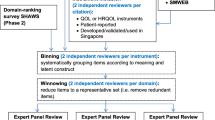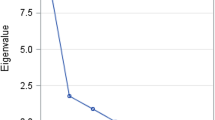Abstract
Identification of patients with poor chronic disease self-management skills can facilitate treatment planning, determine effectiveness of interventions, and reduce disease complications. This paper describes the use of a Rasch model, the Rating Scale Model, to examine psychometric properties of the 50-item Health Problem-Solving Scale (HPSS) among 320 African American patients with high risk for cardiovascular disease. Items on the positive/effective HPSS subscales targeted patients at low, moderate, and high levels of positive/effective problem solving, whereas items on the negative/ineffective problem solving subscales mostly targeted those at moderate or high levels of ineffective problem solving. Validity was examined by correlating factor scores on the measure with clinical and behavioral measures. Items on the HPSS show promise in the ability to assess health-related problem solving among high risk patients. However, further revisions of the scale are needed to increase its usability and validity with large, diverse patient populations in the future.




Similar content being viewed by others
References
American Diabetes Association. (2012). Standards of medical care in diabetes—2012. Diabetes Care, 35, S11–S63.
Andrich, D. (1978). A rating formulation for ordered response categories. Psychometrika, 43, 561–573.
Crawford, A. G., Cote, C., Couto, J., Daskiran, M., Gunnarsson, C., Haas, K., … & Schuette, R. (2010). Prevalence of obesity, type II diabetes mellitus, hyperlipidemia, and hypertension in the united states: Findings from the GE centricity electronic medical record database. Population Health Management, 13, 151–161. doi:10.1089/pop.2009.0039
Dunn, A. L., Resnicow, K., & Klesge, L. M. (2006). Improving measurement methods for behavior change interventions: Opportunities for innovation. Health Education Research, 21, i121–i124.
D’Zurilla, T. J., Nezu, A. M., & Maydeu-Olivares, A. (2002). Social problem-solving inventory-revised (SPSI-R) technical manual. North Tonawanda, NY: Multi-Health Systems, Inc.
Embretson, S. E., & Reise, S. P. (2000). Item response theory for psychologists. Mahway, NJ: Lawrence Erlbaum Associates.
Fitzpatrick, S. L., Saab, P. G., Llabre, M. M., Penfield, R., McCalla, J. R., & Schneiderman, N. (2012). Use of item response theory to examine a cardiovascular health knowledge measure for adolescents with elevated blood pressure. Journal of Methods and Measurement in the Social Sciences, 3, 27–48.
Fitzpatrick, S. L., Schumann, K. P., & Hill-Briggs, F. (2013). Problem solving interventions for diabetes self-management and control: A systematic review of the literature. Diabetes Research and Clinical Practice, 100, 145–161. doi:10.1016/j.diabres.2012.12.016
Hambleton, R. K., & Jones, R. W. (1993). Comparison of classical test theory and item response theory and their applications to test development. Educational Measurement: Issues and Practice, 12, 38–47.
Hill-Briggs, F. (2003). Problem solving in diabetes self-management: A model of chronic illness self-management behavior. Annals of Behavioral Medicine: A Publication of the Society of Behavioral Medicine, 25, 182–193.
Hill-Briggs, F., & Gemmell, L. (2007). Problem solving in diabetes self-management and control: A systematic review of the literature. The Diabetes Educator, 33, 1032–1050; discussion 1051–2. doi:10.1177/0145721707308412
Hill-Briggs, F., Gemmell, L., Kulkarni, B., Klick, B., & Brancati, F. L. (2007). Associations of patient health-related problem solving with disease control, emergency department visits, and hospitalizations in HIV and diabetes clinic samples. Journal of General Internal Medicine, 22, 649–654. doi:10.1007/s11606-006-0091-2
Hill-Briggs, F., Lazo, M., Peyrot, M., Doswell, A., Chang, Y. T., Hill, M. N., … & Brancati, F. L. (2011). Effect of problem-solving-based diabetes self-management training on diabetes control in a low income patient sample. Journal of General Internal Medicine, 26, 972–978. doi:10.1007/s11606-011-1689-6
Linacre, J. M. (2002). Optimizing rating scale category effectiveness. Journal of Applied Measurement, 3, 85–106.
Linacre, J. M. (2003). Size vs. significance: Standardized chi square fit statistic. Rasch measurement. Transactions, 17, 918.
Linacre, J. M. (2009). Local independence and residual covariance: A study of olympic figure skating ratings. Journal of Applied Measurement, 10, 2–13.
Linacre, J. M. (2013a). Winsteps ® Version 3.81.0.
Linacre, J. M. (2013b). Winsteps ® Rasch measurement computer program user’s guide. Oregon: Beaverton.
Masters, G. N. (1982). A Rasch model for partial credit scoring. Psychometrika, 47, 149–174.
McGregor, M., Lin, E. H., & Katon, W. J. (2011). TEAMcare: An integrated multicondition collaborative care program for chronic illnesses and depression. The Journal of Ambulatory Care Management, 34, 152–162. doi:10.1097/JAC.0b013e31820ef6a4
Mulcahy, K., Maryniuk, M., Peeples, M., Peyrot, M., Tomky, D., Weaver, T., & Yarborough, P. (2003). Diabetes self-management education core outcomes measures. The Diabetes Educator, 29, 768–70, 773–84, 787–8 passim.
Murawski, M. E., Milsom, V. A., Ross, K. M., Rickel, K. A., DeBraganza, N., Gibbons, L. M., & Perri, M. G. (2009). Problem solving, treatment adherence, and weight-loss outcome among women participating in lifestyle treatment for obesity. Eating Behaviors, 10, 146–151. doi:10.1016/j.eatbeh.2009.03.005
Peeples, M., Mulcahy, K., Tomky, D., Weaver, T., & National Diabetes Education Outcomes System (NDEOS). (2001). The conceptual framework of the national diabetes education outcomes system (NDEOS). The Diabetes Educator, 27, 547–562.
Rasch, G. (1960). Probabilistic models for some intelligence and attainment tests. Chicago: University of Chicago Press.
Toobert, D. J., Hampson, S. E., & Glasgow, R. E. (2000). The summary of diabetes self-care activities measure: Results from 7 studies and a revised scale. Diabetes Care, 23, 943–950.
Wilson, M., Allen, D. D., & Li, J. C. (2006). Improving measurement in health education and health behavior research using item response modeling: Comparison with the classical test theory approach. Health Education Research, 21, i19–i32.
Conflict of Interest
Stephanie L. Fitzpatrick and Felicia Hill-Briggs declare that they have no conflict of interest.
Human and animal rights and Informed Consent
All procedures followed were in accordance with ethical standards of the responsible committee on human experimentation (institutional and national) and with the Helsinki Declaration of 1975, as revised in 2000. Informed consent was obtained from all patients for being included in the study.
Author information
Authors and Affiliations
Corresponding author
Rights and permissions
About this article
Cite this article
Fitzpatrick, S.L., Hill-Briggs, F. Measuring health-related problem solving among African Americans with multiple chronic conditions: application of Rasch analysis. J Behav Med 38, 787–797 (2015). https://doi.org/10.1007/s10865-014-9603-4
Received:
Accepted:
Published:
Issue Date:
DOI: https://doi.org/10.1007/s10865-014-9603-4




